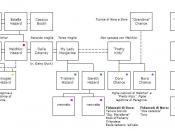Angela Carter Angela Olive Stalker was born on May 7, 1940, in Eastbourne, Sussex, as the daughter of a journalist. During the war years, she stayed with her grandmother, and upon her return to her parents suffered from anorexia, caused by low self esteem. In 1960 she was married to Paul Carter, and moved to Bristol, where she then studied medieval literature at Bristol University until 1965. Carter, who was an atheist, started out in journalism and poetry, then moving into fiction, publishing her first of nineteen works in 1966, Shadow Dance; a kind of detective story and introduced her characteristic interrogation of sexuality. After her divorce, Angela Carter, moved to Japan, where she lived and worked from 1969-1972.
Then moved back to the United States where she was a teacher in Iowa and New York. On February 16, 1992, Angela Stalker Carter died of cancer.
Angela Carter's career as a whole can be viewed as an extended exercise in conscious redefinition, not only of her own culture's environment, but also of her own response to it."(Gamble,4/5)
"Although, she is certainly a feminist writer and is intent on tracing and combating social and fictional representations that oppress women, her work questions ideas surrounding such diverse elements as myth of origin, family dynamics, psychoanalysis, sexuality and aggression, performance, popular culture, language, and the literary canon."(Lee,13/14) Angela Carter puts her heart into her writings, bringing you into her world. She shares her feelings, reactions, and experiences as a woman with you. "She loved to upset expectations, outrage convention, and challenge preconceptions, which meant the only thing that she could be relied upon to do, was the unexpected." (Gamble,2) She was definitely not shy about what she wrote. She was very descriptive, and wrote in a very open, and sometimes, vulgar manner. She was very open about her sexuality and that of others as well. She took something very personal and put it right out in the open for all to see.
"One consistent interest is the position of women in literature, in history, and in the world, and her corpus provides a large number of perspectives from which to see women, and from which women see themselves."(Lee,IX) Carter's females are both victims and victors.
I chose to read two of Carter's selections from her time in Japan. "This is the period in which she claimed was paradoxically responsible for both stimulating her fascination with the graphic extremism of pornographic forms and awakening her feminist consciousness over this decade. Her fiction was increasingly self reflexive and experimental, and also deliberately courted controversy. The dandy moderates into a new, for darker, emblematic subject, a creature who posses the dandy's compulsion for display but combines it with a soul destroying self-centeredness which negates the possibility of any other way of being.(Gamle,8) In the long term, though, her years in Japan provided Carter with new insights which energized her writing for years afterwards.(Gamble,16) The two works that I chose, were, "A Souvenir from Japan", and "Tokyo Pastoral". Both were very well written with many similarities, yet many differences as well.
"A Souvenir from Japan", was written like a diary, much like "Tokyo Pastoral", however, this story was on more of a personal level. Carter describes how she feels, about her much younger Japanese lover, whom she called Taro. Taro was a name symbolizing a man, born of something other than a mother.
A "passive sweetness" as she called it. Carter explained to us how in love she was with Taro, and how in love Taro was with the idea of having Angela as his okusan, or wife figure. Taro loved Angela as something of value, much like a possession. As Angela said, "If he valued me, an object of passion, he had reduced the word to its root patior, which is the Latin equivalent "I suffer". They lived in a society where there was no "happily ever after". They were surrounded by the most moving images of fireworks, the old, children, morning glories. But the ones Carter took with her were the intangible images of themselves, that they saw in each other's eyes. "Reflections of nothing but appearances, in a city dedicated to seeming, and, try as we might to possess the essence of each other's otherness, we would inevitably fail."(Carter) "Carter's description of the unabashedly male-dominated Japanese culture serves a devastating backdrop to a discussion of a relationship rather than a plotted story in the conventional sense.
Nonetheless, Carter manages to drive home such disaffected rage, passion, and sadness that the last lines have the power to reverberate throughout the rest of the collection" (http://www.kirjasto.sci.fi/acarter.htm) You could imagine how damaging it must be, to be so in love with something, who does not share the same intimate feelings with you. Angela Carter, spent most of her time with Taro, sitting in their home, waiting for him to come home. This is the behavior of many of the women in Japan, it is a male dominated society, where women are nothing but a possession. "The story, in its evocation of culture clash, between men and women even more than between Japan and England, is deadly."(http://www.themodernword.com) The mood of this story was up and down. I could really feel how happy Carter was when she was with Taro, yet the mood changed when he decided to leave her for the night after his "duty" to her was done, so that he could go out with his friends. I think that Carter wasn't really writing to a specific audience for this story, but to whoever would listen. I think at this time in her life, she was in very much need of a friend, and when her lover wasn't there for her, she turned to writing.
"Tokyo Pastoral" reminded me of a National Geographic Documentary. I think that Carter was trying to explain to readers, the two sides of her Japanese society. The traditional side, that everyone has come to know and expect, a district where it always seems to be Sunday afternoon, where the women walk around dressed beautifully in elaborate kimonos, the children walking home from school in their neatly pressed sailor suits. Then the mysterious, sexual side that no one sees, where sexuality is very open and accepted. Distributors sell condoms on the street, neatly packaged in attractive purple and gold paper, trademarked "young jelly". Hotels rent rooms by the hour with nothing more than a mattress on the floor, and a red light bulb in the bedside lamp, for those quick lunch time flings. Many of the descriptions of the "Traditional Japan" carried over to her other works as well. She mentions the brisk swish of a broom on the tatami matting, someone effortlessly practicing Chopin on the piano, and the chatter of housewives, in both of her stories. These must be the most memorable for her. The tone in this story, really isn't one with very much feeling. It almost seems like she is giving a lecture. She states facts, and makes observations, but this story isn't really about her, but the society, in which she lives. Carter tries to paint the reader a vivid picture of Tokyo, the crowded, yet cozy city.
"English short story writer, novelist, journalist, dramatist, and critic, Carter was a notable exponent of magic realism, who added into it Gothic themes, violence, and eroticism. Carter utilized throughout her career the language and characteristic motifs of the fantasy genre." (http://www.kirjasto.sci.fi/acarter.htm) "A good writer can make you believe time stands still" (Carter) "Her work represents a successful combination of postmodern literary theories and feminist politics."(http://www.kirjasto.sci.fi/acarter.htm)





